Pharmacy In The Public Sector

College of Pharmacy alumni find compelling opportunities in government ranks
Opener Heading link
Among the UIC College of Pharmacy’s vast network of some 10,000 alumni, a growing number are making contributions, leading innovative efforts, and driving care in the public sector.
Scattered across the government ranks at places such as the U.S. Food and Drug Administration, the Centers for Disease Control and Prevention, and the Veterans Health Administration, College of Pharmacy alumni are dictating medication protocols for thousands, if not millions, of individuals, running research programs related to drug safety and outcomes, and shaping wide-reaching policy that impacts care for large populations. For UIC College of Pharmacy dean Glen Schumock, those professional endeavors stand as an incredible source of pride.
“We are always proud of our alumni that make contributions and lead in their respective areas, and for those doing so in the public sector, it is perhaps more so because of the altruistic motivations that often govern such work,” Schumock says. “We take satisfaction in knowing that the College of Pharmacy contributed in some way to their careers and the wide impact their efforts have on improving human health.”
While not the traditional path many former College of Pharmacy students, residents, and fellows pursue, public sector work has emerged a more appealing and well-traveled path over recent years—and for a multitude of reasons. Some alumni, for instance, see greater practice opportunities in the public sector or are intrigued by the prospects of moving around the country to maximize their career trajectory. Others, meanwhile, are drawn to public service and the opportunity to help more people and, in particular, vulnerable populations without the threat of cost-benefit analyses or corporate profitability overrunning decisions.
To be certain, however, public sector work presents its challenges. It requires pharmacists consciously shift their focus from the specific problems of an individual to care for an entire population, while also demanding pharmacists divorce themselves from their personal beliefs in the name of making objective, fact-based decisions.
“Working in the public sector, you need skills and perspectives that allow for long-range, big-picture thinking as well as the patience to deal with bureaucracy,” Schumock allows.
Through the electives, mentorship, extracurriculars, and other opportunities the College of Pharmacy provides, including access to competitive residencies and fellowships, Schumock says, the College fosters the necessary skills and mindset for alumni to thrive in the public sector.
“UIC opens the door for our alumni to excel in these types of positions with government agencies,” he says.
And excel they do.
Fran Cunningham, PharmD, Res ’88, Fel ’89 Heading link
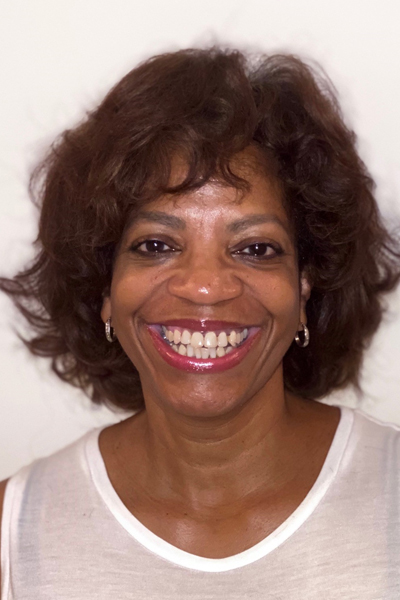
Fran Cunningham, PharmD, Res ’88, Fel ’89
Associate Chief Consultant for Pharmacy Benefits Management, Director of the Center for Medication Safety
U.S. Department of Veterans Affairs (VA)
After 10 years—and tenure—as a UIC College of Pharmacy faculty member, Dr. Cunningham left the west campus in 2000 for a too-good-to-be-true job with the VA. “I thought I’d be in academia for the long haul, and it was pure serendipity that this job developing a national outcomes research program at the VA appeared before me.”
In her role with pharmacy benefits management, Cunningham works on medication safety surveillance and outcomes. The primary emphasis is on veteran care and VA policy, though she also supplies information for congressional members and hearings. At the VA Center for Medication Safety, meanwhile, Cunningham oversees the VA’s entire comprehensive pharmacovigilance program, which includes collaborating with other federal agencies on medication and vaccine safety and directing a research program focused on medication safety issues pertinent to pharmacy. “Being able to directly help veterans, giving back to those who have given to us, is the reason I do it and the reason I stay.”
Cunningham developed the VA’s Active Surveillance Program, which tracks adverse drug events utilizing databases, as well as a dynamic prospective medication-use evaluation program that allows for tracking the safe and appropriate use of medications in real-time. “Programs like these are why I came to VA: to help patients on a large scale.”
Cunningham credits her UIC residency for advancing her clinical skills and her fellowship for propelling her research skills. “I always tell my staff that you can’t design a good research or surveillance project without being a sound clinician first.”
Christopher Dao, PharmD ’16 Heading link
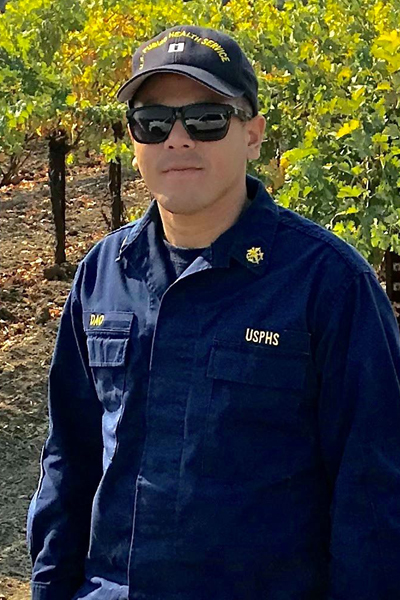
Christopher Dao, PharmD ’16
Assistant Health Services Administrator
U.S. Public Health Service (USPHS)
Dr. Dao hadn’t given much thought to government work until he read an APhA article about pharmacists employed in the Bureau of Prisons. “The opportunity to help different populations and to do something nontraditional seemed exciting.” His interest accelerated further after gaining different perspectives from alumni guest speakers and enjoying clinical rotations at the VA.
Dao began working at the federal prison in Phoenix, Arizona, in 2019 after two years as a staff pharmacist at the Federal Medical Center in Fort Worth, Texas. Today, he oversees health services, including a team of physicians, nurses, pharmacists, paramedics, and other healthcare providers, and drives care for the prison’s 1,300 residents. “I love the environment and using my knowledge to make the best clinical decisions for a truly underserved population.”
Much of Dao’s work revolves around ensuring that healthcare systems in the facility run smoothly, which means anticipating problems and crafting creative solutions. His forward-thinking leadership allowed the Phoenix prison to avoid a single case of COVID-19 throughout the spring months. “I’m forced to imagine different scenarios, mind the details, and problem solve, which is challenging, yet rewarding work.”
Currently leading an interdisciplinary team, Dao’s grateful for a UIC education that introduced him to the entire spectrum of patient care—from a provider’s assessment to a medication order to follow-up care—and allowed him to see beyond the pharmacist’s role. “That helped me understand the important roles different professionals fill and taught me how to communicate with providers, staff, and patients.”
Karine Rozenberg, PharmD ’92 Heading link
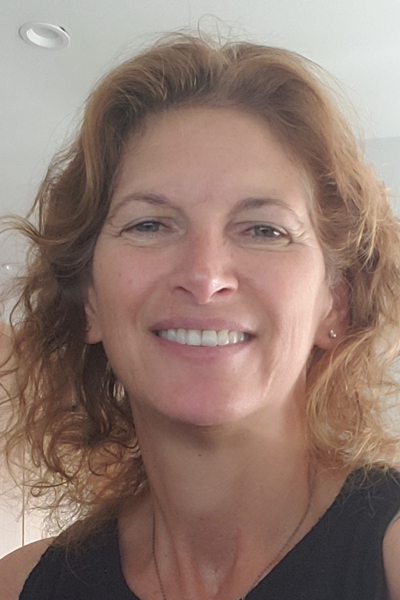
Karine Rozenberg, PharmD ’92
Hepatitis C/Advanced Liver Disease Task Force Manager for VISN 12 and Chair of the National Advanced Liver Disease (ALD) Dashboard Coordinators
U.S. Department of Veterans Affairs (VA)
After a six-month stint at Osco following graduation, Dr. Rozenberg jumped at the chance to join the VA. The Israel-born daughter of Holocaust survivors first served veterans on the medicine floors at Chicago’s Lakeside VA Hospital before moving to the hospital’s ambulatory care clinic. “Veterans are the most important reason for this country’s freedom, and their continued sacrifice can’t be overstated.”
In her current role with VISN 12, Rozenberg collaborates with an interdisciplinary team of providers to care for veterans with viral hepatitis and advanced liver disease. Notably, she worked with a clinical informatics pharmacist to develop a dashboard that identifies and links Hepatitis C (HCV) patients in the VISN 12 network to care.
After attending a VA HCV meeting in 2011, Rozenberg learned other VA networks did not have dashboards. She worked with a team of developers to deploy the HCV dashboard systemwide, subsequently propelling treatment for more than 100,000 veterans infected with HCV. “At the end of the day in clinic, you can only impact the patients you reach personally. The dashboard allowed me to be a part of helping veterans by the thousands.” As chair of the National ALD Dashboard Coordinators, Rozenberg continues unveiling dashboards to manage other disease states.
At UIC, Rozenberg learned to be a flexible, creative problem solver. “What I do today would not be possible without the strong training in pharmaceutical care I received at UIC.”
Sonal Goyal, PharmD ’10 Heading link
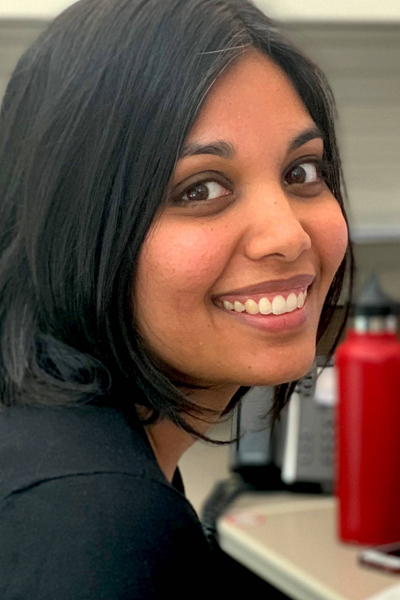
Sonal Goyal, PharmD ’10
Epidemic Intelligence Service Officer
Centers for Disease Control and Prevention (CDC)
As a service-oriented PharmD student, Dr. Goyal was intrigued by a career with the CDC. “I could see the impact that the CDC had on improving population health and my goal was to improve the health and wellbeing of as many people as I possibly could.”
Over the last two years at the CDC, Goyal, who also holds a master’s in public health, has led epidemiologic investigations, studied public health threats, and assessed current public health practices largely related to home births and opioid use among women of reproductive age. “I love knowing that the work I do is purposeful and has the potential to impact many lives.”
In a recent project with the Massachusetts Department of Public Health, Goyal led an evaluation of the state’s substance-exposed newborn surveillance system. She spearheaded the development of case definitions, data collection forms, and medical chart abstraction from 15 birthing hospitals before leveraging that data to inform surveillance as well as maternal and newborn care for the seven million residents across the state. “I enjoy being able to use data to answer difficult questions.”
Goyal’s time at UIC ignited her curiosity in statistics and analysis, while also allowing her to hone skills like problem-solving and emotional intelligence. “Having the opportunity to interact with and learn from students and professors from varied backgrounds and identities expanded upon my understanding of the world and improved my communication skills, which has been key to establishing partnerships and creating sustainable, long-term solutions.”
Ben Le, PharmD ’11 Heading link
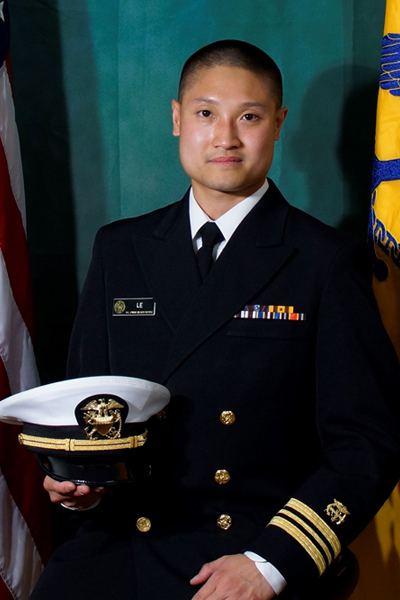
Ben Le, PharmD ’11
Lieutenant Commander
U.S. Public Health Service (USPHS)
As a first-year pharmacy student at UIC, Dr. Le listened as a USPHS officer introduced government service. Le was immediately drawn to the opportunity and selected experiential rotations applicable to that career. “I liked the idea of public service and saw a chance to apply my strong work ethic to opportunities in and beyond pharmacy like informatics, contracting, finance, environmental health, public health, and leadership.”
Le currently serves as the chief pharmacist at the Nevadabased Elko Service Unit of the Indian Health Service (IHS). Supervising the ambulatory care pharmacy department, Le educates patients on nutrition, physical activity, and medication therapy; leverages his technical background to educate coworkers on software and troubleshoot system errors; and directs contracting and finance processes. He is also now expanding the department’s pharmacotherapy collaborative practice agreements. “We want to become an even greater asset for the health center, and I enjoy the opportunity to learn from and teach others, so we’re fully supporting our mission.”
Le, who received his environmental health specialist certification in 2018, also serves as the Elko Service Unit’s safety officer. He works closely with the tribal lessor housekeeping and maintenance staff, which includes everything from shoveling snow to partnering with architectural, electrical, and civil engineers to complete a facility condition assessment. “In a career to advance public health, it’s important to improve clinical and leadership skills, and my education at UIC prepared me well for the different roles I have with IHS.”
Matt Deraedt, PharmD ’17 Heading link
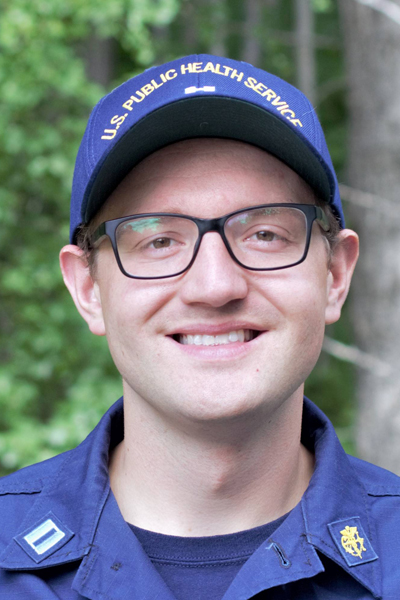
Matt Deraedt, PharmD ’17
Lieutenant
U.S. Public Health Service (USPHS)
After completing a PGY1 residency with the Indian Health Service (IHS) in Anchorage, Alaska, Dr. Deraedt remained at the Alaska Native Medical Center as an emergency department pharmacist. A go-to resource for all pharmacotherapy questions from both providers and patients, Deraedt attends to medical emergencies and practices at the top of his license in a fast-paced, diverse environment. “I like being challenged and empowered to use everything I learned in school and during my residency to provide the best patient care.” Deraedt helped launch the ER pharmacy program at Alaska Native, an effort for which he leaned on a network of ER pharmacists and UIC alumni he had met during his PharmD years. “That network has been so critical in discussing procedures, treatments, and how to handle different situations.”
Deraedt has seen USPHS coworkers sent to Puerto Rico to assist after Hurricane Maria and others recently dispersed to COVID-19 hotspots across the United States. While Deraedt has yet to be deployed to an emergency situation, the possibilities excite. “One week, I am an ER pharmacist, and the next, I could be responding to a national disaster. Helping people in need is a real passion of mine and something this career enables.”
Deraedt credits UIC with providing him a strong clinical background, while a three-year experience working with Drs. Larry Danziger and Keith Rodvold exposed him to valuable research methods. “My time at UIC set me up for success with so much background knowledge to build upon.”
Nazia Fatima, PharmD ’07 Heading link
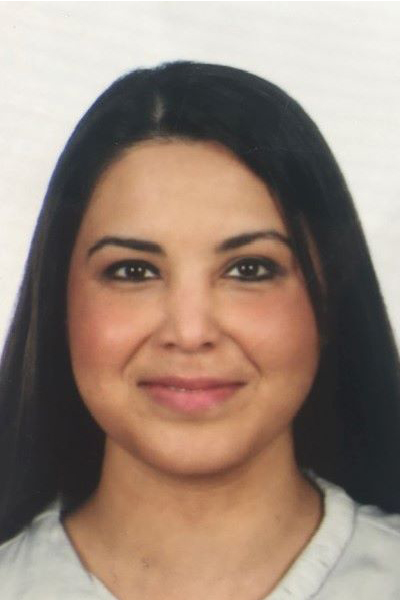
Nazia Fatima, PharmD ’07
Consumer Safety Officer
U.S. Food and Drug Administration (FDA)
At UIC, Dr. Fatima gained a strong scientific background— “Everything that I do stems from that.”—and also enjoyed a clerkship that sparked a postgraduate job with Ovation Pharmaceuticals. Over seven years in industry with Lundbeck Pharmaceuticals (formerly Ovation), Fatima participated in the launch of seven drugs.
After earning her MBA from Northwestern University and contemplating different career opportunities, Fatima joined the FDA in 2013. She admits it was a notable shift, moving from a private startup to a large regulatory agency. Though she admittedly second-guessed her decision at the onset, those days have long passed. “It’s truly an honor and privilege to serve in a public service role.”
At the FDA’s Office of Prescription Drug Promotion (OPDP) in Maryland, Fatima is a subject matter expert in oncology advertising and promotional review. She evaluates materials submitted by industry and has been involved in at least 70 new drug and/or supplemental approvals. “It’s been a very humbling experience to be part of the drug approval process, especially knowing the impact that these drugs can have on patients and families.”
Fatima fully embraces the weighty nature of her work. “The FDA’s mission is to protect public health, and I take this responsibility seriously. Being part of a regulatory agency that is at the intersection of science, policy, regulatory, and medicine is challenging, but also very exciting.”